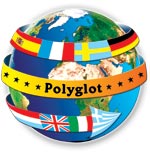I’ve just returned from Morocco, where I was struck by the country’s enthralling cultural diversity, which is reflected in and epitomized by its linguistic variety (there are three standard languages spoken there: French, English and Moroccan Arabic — and that’s just the locals talking, we’re not including the tourists…). The continent of Africa is home to more than 2,100 languages — some estimate more than 3,000, many of which are spoken around the world. About a hundred African languages are used for mass inter-ethnic communication; Arabic, Amharic, Berber, Hausa, Igbo, Oromo, Somali, Swahili and Yoruba are spoken by tens of millions of people. Nigeria alone has 500 languages. Most languages spoken in Africa belong to one of three large language families: Afroasiatic, Nilo-Saharan, and Niger-Congo.
The Niger–Congo languages constitute Africa’s largest language family in terms of geographical area, number of speakers, and number of distinct languages. The most widely spoken Niger–Congo languages by number of native speakers are Yoruba, Igbo, Fula, Shona and Zulu. The most widely spoken by total number of speakers is Swahili. Although Swahili is the mother tongue to only about five million people, it is used as a lingua franca (a working, bridging or unifying language) in much of the southern half of East Africa; it serves as the official language of four nations — Tanzania, Kenya, Uganda and the Democratic Republic of the Congo — and is one of the official languages of the African Union. The total number of Swahili speakers exceeds 140 million.
More than 300 million people speak an Afroasiatic (also known as Hamito-Semitic) language; these are spoken predominantly in the Middle East, North Africa, the Horn of Africa, and parts of the Sahel. The most widely spoken Afroasiatic language is Arabic.
Nilo-Saharan languages are spoken by about 50 million people, mainly in the upper parts of the Chari and Nile rivers, and extending through 17 nations in the northern half of Africa.
~~~~~~
Many words that we use on a daily basis are imports from the French language. Premiere, ballet, genre, unique, liaison, resume, and fiance are just a few examples. Although not nearly as numerous, there are several words in standard English that originated in Africa — including a few that are quite surprising. Did you know, for example, that bogus originally comes from the Hausa (West African) word boko-boko, meaning fake or fraudulent? Jumbo, meaning unusually large, comes originally (and via P.T. Barnum) from the Swahili jumbe or jambo, meaning elephant. And I had always assumed that tango was Spanish or Latin in origin, but it’s from an African word in the Niger-Congo family of languages meaning “to dance”.
Here are some other words that came from this most exotic and beautiful of continents:
banana: West African (possibly a Wolof word)
bozo: West African for “stupid”
dig (in the sense of to appreciate or understand): from the Wolof dega, used at the beginning of a sentence to mean either “look here” or “understand”
guys (informal word for people): David Dalby, founding director of the Linguasphere Observatory (a transnational linguistic research network), contends that there’s a direct connection between guys and the Wolof word gay, meaning person or fellow and always used in the plural form
jukebox: from juke, joog meaning “wicked, disorderly” in Gullah, probably from Wolof and Bambara dzug meaning “unsavory”
Okay: there are numerous theories about where this word — now used and understood all over the world — originated, but it’s widely believed that it might be from the Wolof expression “waw kay”, meaning “all correct”
tango: originally the name of an African-American drum dance, probably from a Niger-Congo language, eg. the Ibibio tamgu meaning “to dance”
tote: a popular theory is that this originated in West African languages: the Kikongo tota meaning “to pick up,” or the Kimbundu tuta meaning “carry, load,” related to Swahili tuta “pile up, carry”. (However, the OED disputes this etymology.)
safari: from the Swahili word meaning “to travel”
zombie: originally a Creole word “zobi”, of Bantu origin, from the Kikongo word zumbi, meaning “fetish”, and the Kimbundu word nzambi, meaning “god”, zombie was originally the name of a snake god. Zombie was first used in the 19th century to mean voodoo dead spirits. More recently it has taken on a new meaning of “automaton” or someone who looks like a robot or lifeless being.













